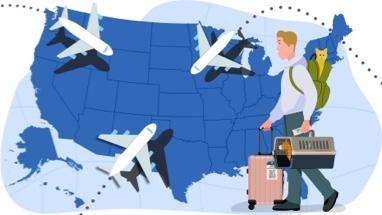Pet Travel From the United States to Marshall Islands
Travel Requirements Based on Pet Type
Carefully read ALL of the requirements related to your pet on this page.
- This page provides the most recent entry requirements and can change without notice.
- It is the responsibility of the veterinarian to make sure the pet has met all health requirements of the destination country before issuing a health certificate.
- Failure to meet the requirements may result in problems gaining certificate endorsement or difficulties upon arrival in the destination country.
- Health certificates must be legible, accurate, and complete.
- Limited Veterinary Services are available on a day-to-day basis. Routine services provided include:
- rabies inoculations
- limited care of sick or injured animals
- special medications if available
- A doctor of veterinary medicine visits USAKA approximately two (2) to four (4) times a year on an announced basis for routine animal care.
- ALL imported pets will enter USAKA via Hawaii and will complete MANDATORY HAWAIIAN QUARANTINE REQUIREMENTS as necessary.
- ALL requests for Pet Entry must be accompanied by a letter indicating:
- type of animal, age, sex, and size
- address where animal will reside
- dates of Hawaii Quarantine - if possible
- A Health Certificate documenting that the animal has been inoculated against rabies and is generally healthy and free from any signs of diseases; and documentation that the animal has been spayed/neutered prior to entry MUST be presented for examination by the Medical Officer or Veterinary Services Department.
- Animals MUST be dipped or otherwise treated to free the animal of external parasites (i.e. fleas, etc.) within five (5) days prior to entry. This is to include spraying/treatment of the animal cage. This is especially important if the animal was purchased in Hawaii because the state is known to have a flea problem.
- ALL animals MUST be registered with the Veterinary Services Department with registration renewed annually.
- ALL owners will ensure that proper medical records are maintained and all required shots/inoculations are kept up-to-date at the owner's expense.
For pet travel requirements not listed, APHIS has not been officially informed by the foreign country about the requirements for your pet’s travel. We recommend that you contact a government official of the country you are traveling to for more information.
Country of Destination Contact Information
Countries Participating in the European Union
Austria
Belgium
Bulgaria
Croatia
Cyprus
Czech Republic
Denmark
Estonia
Finland
France
Germany
Greece
Hungary
Republic of Ireland
Italy
Latvia
Lithuania
Luxembourg
Malta
Netherlands
Northern Ireland*
Norway**
Poland
Portugal
Romania
Slovakia
Slovenia
Spain
Sweden
Switzerland**
* Northern Ireland is part of the United Kingdom (UK), but will continue to follow European Union (EU) requirements even though the UK is no longer part of the EU.
** Norway and Switzerland are not part of the EU but have adopted EU legislation for import of most species of live animals.
Need Help?
Still Have Questions?
USDA-Accredited Veterinarians
Contact a USDA-accredited veterinarian for questions about your destination country's entry requirements for pets (including any needed vaccinations, tests, or treatments) and for issuance of health certificates.
Find a USDA-Accredited Veterinarian
USDA Endorsement Offices
Contact your nearest APHIS Veterinary Export Trade Services Endorsement Office for questions about endorsing a health certificate for pets.
Looking for Another Country?
Find your destination country requirements by using the dropdown menu below. If your country is not listed in the menu, visit Pet Travel: Unknown Requirements.




